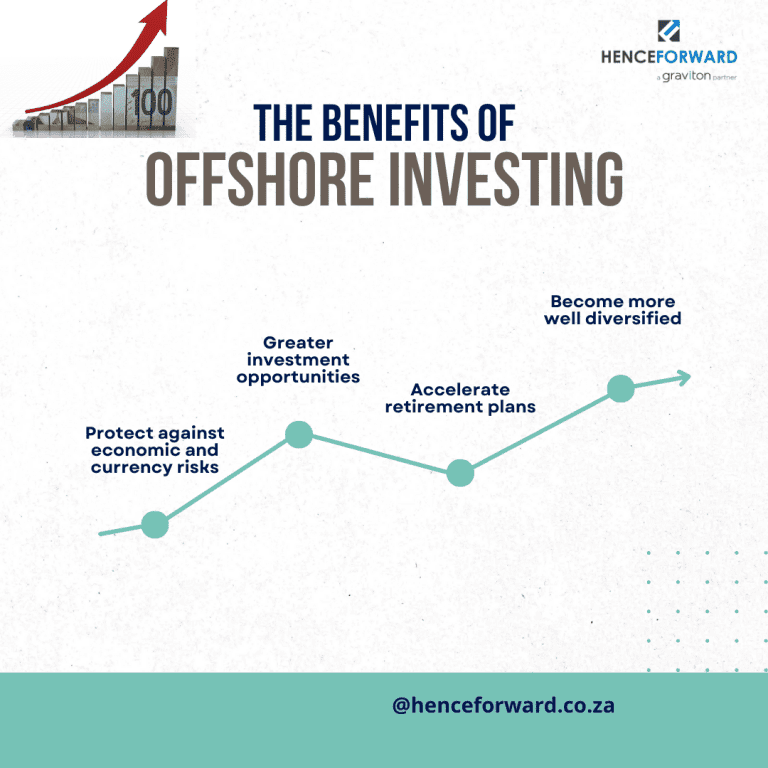Recognizing the Importance of Spending Off Coast for Wealth Diversification
Offshore investing plays a substantial role in wide range diversity. It permits people to take advantage of a larger array of worldwide markets and financial investment chances - Investing Off Shore. This approach can successfully mitigate dangers tied to domestic economic uncertainties. Additionally, overseas financial investments may offer regulatory and tax benefits. Nonetheless, lots of continue to be unaware of the intricacies and nuances included. Comprehending these components is vital for any individual considering this technique for their monetary future. What variables should one think about prior to starting?
The Concept of Offshore Investing
Offshore investing refers to the practice of positioning properties in monetary markets outside one's home nation, often to achieve greater economic safety and security and diversification. This method permits people and firms to gain access to different worldwide markets, possibly taking advantage of various economic climates, money values, and financial investment possibilities. Capitalists may choose overseas accounts for factors such as governing benefits, tax benefits, or privacy protection.The concept incorporates a series of investment cars, consisting of stocks, bonds, realty, and shared funds, offered through international monetary organizations. Furthermore, offshore investing can help minimize threats linked with residential market changes. By spreading investments globally, people can potentially safeguard their wide range against financial or political instability within their home nation. Generally, offshore investing functions as a strategic approach to boost monetary portfolios, offering access to a more comprehensive variety of properties and possibilities past neighborhood markets.
Benefits of Expanding Your Investment Profile

Danger Mitigation Techniques
How can capitalists effectively take care of danger while maximizing returns? One vital method is asset allotment, which involves dispersing investments across various property classes to reduce exposure to any kind of single danger. Investors can branch out geographically by including overseas assets, which frequently act in different ways than residential investments, therefore reducing overall portfolio volatility. Furthermore, integrating alternative financial investments, such as actual estate or commodities, can supply added risk reduction. Consistently rebalancing the portfolio ensures that property appropriations stay lined up with threat resistance and investment goals. Comprehending market fads and economic signs can assist capitalists expect changes and adjust their profiles accordingly. Ultimately, a well-structured financial investment strategy emphasizes diversification, aiming to stabilize possible returns with acceptable levels of risk.
Currency Diversity Advantages
Investors who integrate money diversity into their profiles can enhance their potential for returns while minimizing exposure to neighborhood economic variations. By holding possessions in multiple money, they can maximize favorable exchange rate motions and minimize losses from money devaluation in their home market. This technique not only spreads out risk but additionally opens opportunities for financial investment in arising markets, which may supply greater growth capacity. Additionally, currency diversity can work as a bush against rising cost of living and political instability, supplying a buffer throughout financial downturns. In general, this method promotes an extra resistant investment profile, allowing capitalists to browse worldwide markets with greater versatility and self-confidence, inevitably leading to boosted long-lasting economic security.
Lowering Danger With Geographic Diversity
Geographical diversification uses significant advantages by spreading investments across numerous regions and markets. This approach aids reduce risks linked with financial instability, as slumps in one area may be offset by development in one more. In addition, purchasing arising markets can supply special possibilities for greater returns and additionally enhance portfolio durability.
Advantages of Geographical Diversification
Why should one consider geographical diversification as a method for threat reduction? Geographical diversity allows financiers to spread their assets across various countries and areas, mitigating the impact of localized financial downturns. By investing in multiple markets, one can gain from different development cycles, money movements, and market dynamics. This strategy lowers dependancy on a solitary economic situation, which can be vulnerable to political instability or all-natural disasters. In addition, geographic diversity can improve profile performance by taking advantage of arising markets with high growth potential. It gives a barrier against rising cost of living rates that might vary by region, making sure that the overall value of financial investments continues to be stable. Eventually, geographical diversity is a sensible strategy for securing riches against uncertain global events.
Reducing Economic Instability Risks

Economic instability can posture considerable risks to investment portfolios, making it necessary to take on techniques that alleviate these threats. One efficient technique is geographic diversification, which involves spreading investments throughout different areas and countries. By assigning possessions in different financial environments, investors can minimize their exposure to local financial downturns. As an example, if one country deals with an economic downturn, financial investments in other areas may continue to be stable or perhaps thrive, offering a buffer against possible losses. In addition, purchasing numerous currencies can further shield against money changes and inflation dangers. In general, decreasing financial instability dangers through geographic diversity not just improves strength however additionally placements investors to confiscate possibilities in various markets, inevitably fostering long-term financial security.
Purchasing Emerging Markets
Spending in emerging markets supplies a tactical opportunity for minimizing threat through geographical diversification. These markets, often characterized by fast development and progressing financial landscapes, can supply article source one-of-a-kind opportunities that are less correlated with developed markets. By designating resources to countries with growing sectors and expanding customer bases, financiers can mitigate the effect of localized economic slumps. In addition, arising markets might display higher development potential, enabling financiers to take advantage of desirable demographic patterns and increasing international need. Nevertheless, it is vital to recognize the fundamental risks, including political instability and money changes (Investing Off Shore). A well-researched and balanced technique enables investors to harness the advantages of emerging markets while efficiently handling prospective downsides, inevitably enhancing their total portfolio resilience
Accessing Emerging Markets and Opportunities
As global markets advance, accessing emerging markets offers an engaging avenue for wide range diversification. These markets commonly reveal quick development capacity, driven by boosting consumer demand and technological improvements. Capitalists can take advantage of markets such as technology, renewable power, and facilities, which are crucial in driving financial expansion in these regions.Strategically investing in arising markets enables financiers to take advantage of favorable demographics and increasing middle-class populaces. This creates unique possibilities for businesses to prosper and, consequently, for capitalists to take advantage of significant returns. In addition, arising markets often show reduced relationships with developed markets, providing a buffer versus volatility.To successfully access these opportunities, financiers can make use of different automobiles, including exchange-traded funds (ETFs), shared funds, and straight equity financial investments. By expanding their portfolios with emerging markets, investors can improve their general risk-adjusted returns while placing themselves advantageously in a regularly changing worldwide landscape.
Currency Protection and Hedging Approaches

Legal Considerations and Compliance in Offshore Spending
Steering via the intricacies of overseas investing calls for a keen understanding of the lawful landscape and conformity demands that vary by jurisdiction. Investors must extensively comprehend policies worrying international financial investments, tax, and reporting responsibilities to assure conformity with both neighborhood and worldwide regulations. Numerous countries have specific regulations controling the facility of overseas accounts and entities, which can consist of rigorous Know Your Customer (KYC) and Anti-Money Laundering (AML) regulations.Furthermore, capitalists must beware about potential legal mistakes, consisting of tax obligation evasion or inadvertent offenses of safeties regulations. Involving with respectable legal experts or economic advisors accustomed to offshore laws is important to navigate these complexities. Furthermore, staying educated about adjustments in guidelines and laws is necessary, as non-compliance can cause serious fines. Eventually, an extensive understanding of legal factors to consider assurances that offshore financial investments contribute positively to wide range diversification without sustaining legal repercussions.
Actions to Get Going With Offshore Investments
Numerous capitalists looking for to expand their riches may locate the process of beginning overseas investments both tough and rewarding. The first step entails detailed research to determine ideal overseas jurisdictions that align with investment objectives and supply favorable laws. Following this, capitalists should pick a trusted banks or investment firm experienced in overseas financial investments. Opening up an offshore account is critical, necessitating the submission of personal identification and conformity documents.Next, investors ought to assess different financial investment choices, such as realty, common funds, or supplies, making certain they line up with danger tolerance and monetary goals. Consulting with legal experts or financial advisors can offer valuable insights into the complexities of offshore investments. Finally, routine surveillance and re-evaluation of the financial investment profile are vital to adjust to market adjustments and ensure peak efficiency. By adhering to these actions, investors can efficiently browse the offshore investment landscape.
Often Asked Questions
What Kinds Of Assets Can I Buy Offshore?
The current question explores different offshore financial investment choices. Individuals can consider possessions such as genuine estate, shared funds, stocks, bonds, precious steels, and cryptocurrencies, each offering distinctive advantages depending upon personal financial objectives and risk tolerance.
Exist Minimum Investment Amounts for Offshore Accounts?
Minimum financial investment amounts for offshore accounts vary considerably relying on the organization and sort of account. Some need as low as a couple of thousand dollars, while others might stipulate greater thresholds for premium solutions and financial investment possibilities.
Exactly How Do Taxes Work on Offshore Investments?
Tax obligations on offshore financial investments differ by territory and the capitalist's home country. Usually, earnings created might be subject to taxes locally, while some nations may use tax rewards or exceptions for sure offshore accounts.
Can I Handle Offshore Investments Remotely?
Taking care of overseas investments remotely is indeed possible. Many banks use on-line platforms, making it possible for financiers to monitor and negotiate perfectly from anywhere, supplied they comply with regulatory demands and comprehend the affiliated risks Continue and fees.
What Prevail Misconceptions Regarding Offshore Spending?
Typical false impressions regarding overseas investing include the idea that it is exclusively for the wealthy, inherently illegal, or excessively made complex. In truth, it can be available, lawful, and convenient for numerous investors seeking diversification. By spreading investments across numerous property courses and geographical areas, capitalists can protect themselves against market volatility and money variations. Geographical diversity provides substantial advantages by spreading out investments throughout numerous regions and markets. Additionally, arising markets regularly display reduced correlations with established markets, using a buffer against volatility.To effectively accessibility these chances, capitalists can use different vehicles, consisting of exchange-traded funds (ETFs), shared funds, and direct equity investments. Following this, financiers should pick a trustworthy financial establishment or financial investment company experienced in offshore investments. Normal monitoring and re-evaluation of the financial investment portfolio are vital to adapt to market modifications and guarantee peak efficiency.
Comments on “Investing Off Shore: Everything You Need to Know About Legal Compliance”